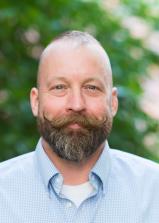Christopher Marshall
He/Him| They/Them
I am gay and I am a biologist.//
Hi I’m Chris and I’m a faculty member at Oregon State University where I am the curator for the university’s insect collection, the Oregon State Arthropod Collection. I’m a member of the Department of Integrative Biology and along with my curatorial duties, conduct some research and teach as well. My research interests are in the taxonomy, biogeography and natural history of Pacific Northwest insects, especially scarab beetles and their close relatives. In addition to research on insects, a I am interested in the relationship of natural history collections to science, both in terms of how they can better provide specimens and specimen data to scientists, but also how museum science and museum management (in other words: curation) fits into the profession of modern science. Over the last 5 years, I’ve become increasingly interested in how gender, race, sexual orientation and other facets of society are related to (positively and negatively) natural history collections and life sciences and am looking at means to broaden the narratives associated with these resources, so that they more fully encompass and serve to inspire/connect with as broad a community as possible.
I am fortunate to have grown up in, and live today, in a part of the country that is relatively accepting of LGBTQ+ people. I was also fortunate (especially in the 1980’s) to have been surrounded by family/friends who were supportive of me, my career goals and my orientation during a time period where the gay rights movement was still young. While I am happily married today, the battle is not over and LGBTQ+ people are still fighting for equality, especially in arenas traditionally viewed, and historically defined, as ‘masculine’. I consider modern science to be one of these arenas and would like to see novel, less gendered, approaches to how we portray, teach and conduct our field of study. I think this will not only make STEAM more attractive to a broader array of people, but will improve the actual science we do.
